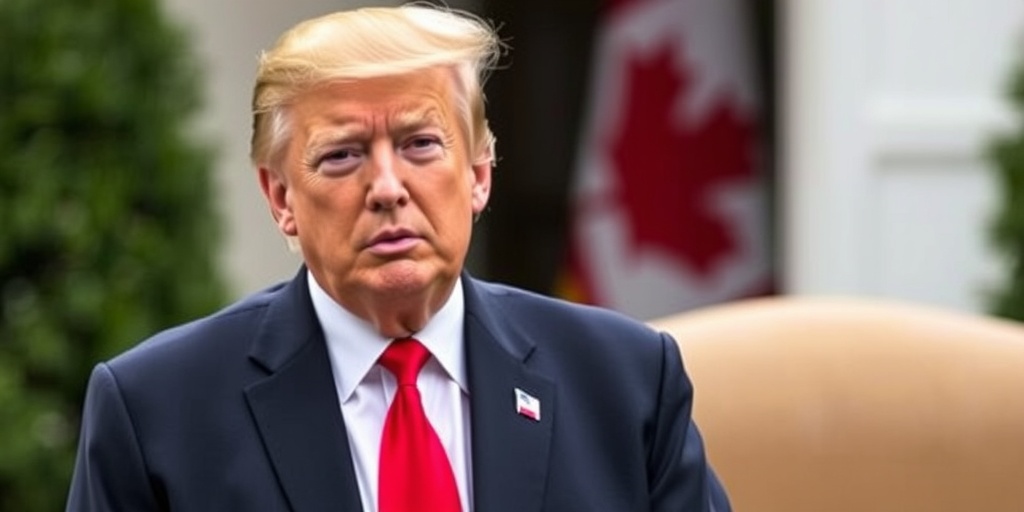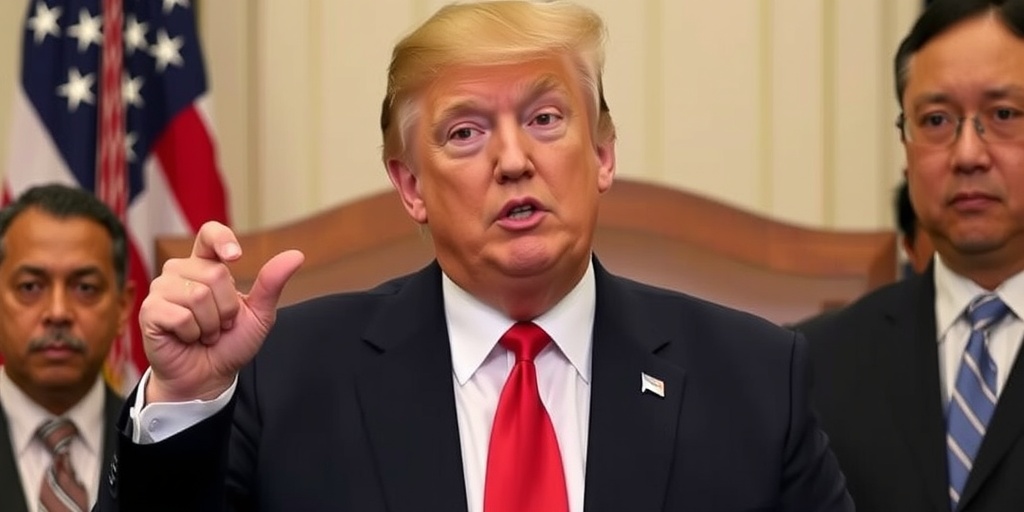Now Reading: Trump Softens Rhetoric Towards Canada Following Call with PM
-
01
Trump Softens Rhetoric Towards Canada Following Call with PM
Trump Softens Rhetoric Towards Canada Following Call with PM

Title: President Trump Modifies Rhetoric in Light of New Canadian Prime Minister Carney
In a notable shift in diplomatic tone, President Donald Trump softened his approach towards Canada following his first telephone call with the country’s new Prime Minister, Mark Carney, on Friday. This change marks a departure from the previously frequent barbs aimed at Canada under Trudeau’s leadership, where Trump often referred to the country derisively, calling it the “51st U.S. state.” In his latest communications, Trump refrained from such rhetoric, addressing Carney by his proper title and name.
During the call, Trump expressed optimism about U.S.-Canada relations, suggesting that both countries could forge a more favorable partnership moving forward. He commented on social media about the call, labeling it “extremely productive” and highlighting the areas of agreement he found with the new Prime Minister. In remarks to reporters after the call, he aligned Canada with nations that he does not consider unfair trading partners, noting, “Many countries have taken advantage of us,” yet asserting, “but not Canada.”
Despite the warming of sentiments, the backdrop to this diplomatic development includes impending tariffs that Trump plans to impose on numerous trading partners, Canada included, starting on April 2. He confirmed that his administration intends to move forward with a 25 percent tariff on imported vehicles and parts, a decision that has already drawn ire from Canadian officials.
Carney, previously the Governor of the Bank of England and the Bank of Canada, took office as Prime Minister on March 14, succeeding Justin Trudeau as the leader of the Liberal Party amidst a challenging political landscape. His election campaign is heavily influenced by Trump’s aggressive trade policies, notably the tariffs, which have sparked resentment in Canada. In light of Trump’s announcement for tariffs on cars, Carney had previously stated that Canada might reassess its economic relationship with the U.S. due to a perceived declining reliability on the U.S. as a partner, further stating, “It is clear that the United States is no longer a reliable partner.”
Reflecting on the conversation, Carney portrayed a relatively subdued stance towards the United States, characterizing the call as “positive, cordial, constructive—exactly what we want.” However, the conversation did not yield any commitments from Trump to remove existing tariffs on automobiles or Canadian steel and aluminum. Both leaders did agree to initiate “comprehensive negotiations about a new economic and security relationship” after Canada’s upcoming election slated for April 28.
In the interim, discussions will intensify between Trump’s Commerce Secretary, Howard Lutnick, and Canada’s Trade Minister, Dominic LeBlanc, to address immediate economic concerns. Notably, the contentious issue of Canada’s sovereignty—a topic Trump had previously broached—was reportedly not addressed directly in their conversation. Carney remarked, “The president respected Canada’s sovereignty today,” a statement that reflects a desired evolution in the relationship between the two nations.
Despite the apparent cordiality of the call, not all remarks from Trump regarding Canada were favorable on that day. When pressed about the impending tariffs, Trump affirmed with firmness, “I will absolutely follow through.” This statement underscores the ongoing tension that underpins U.S.-Canada trade relations, even as both leaders seek to manage their diplomatic correspondence with care.
The divergences in their approaches were underscored by comments from Vice President JD Vance, who reiterated earlier criticisms about Canada imposing “an unfair set of rules” on the United States. Vance emphasized an unwavering belief that “There is no way that Canada can win a trade war with the United States,” thus mirroring the hardline stance that has characterized much of Trump’s trade policy.
Further complicating the landscape is the reaction from Pierre Poilievre, the Conservative leader and Carney’s nearest rival in the upcoming election. Poilievre remarked on the change in Trump’s tone, interpreting it as an endorsement of the Liberal party’s governance, suggesting that they have been conducive to Trump’s agenda. He asserted, “He wants to take our money and our jobs, and Liberals have helped him do it,” positioning himself as a critic of the current administration’s handling of trade relations with the U.S.
As both leaders navigate this complex interplay of diplomacy and domestic politics, the implications of their interaction may very well shape the future course of U.S.-Canada relations in the coming months. This development serves as a crucial reminder of the volatile nature of international relations and trade, particularly in an era marked by shifting political landscapes and national priorities.
Stay Informed With the Latest & Most Important News
Previous Post
Next Post
-
 01New technology breakthrough has everyone talking right now
01New technology breakthrough has everyone talking right now -
 02Unbelievable life hack everyone needs to try today
02Unbelievable life hack everyone needs to try today -
 03Fascinating discovery found buried deep beneath the ocean
03Fascinating discovery found buried deep beneath the ocean -
 04Man invents genius device that solves everyday problems
04Man invents genius device that solves everyday problems -
 05Shocking discovery that changes what we know forever
05Shocking discovery that changes what we know forever -
 06Internet goes wild over celebrity’s unexpected fashion choice
06Internet goes wild over celebrity’s unexpected fashion choice -
 07Rare animal sighting stuns scientists and wildlife lovers
07Rare animal sighting stuns scientists and wildlife lovers





















